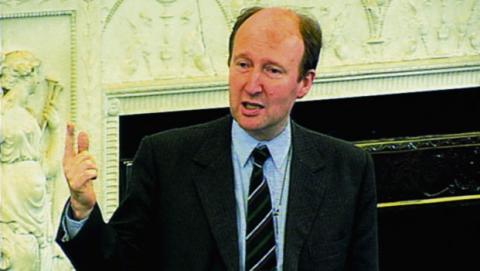"Decisions to reinstate credibility will come from outside Ireland" - Shane Ross

In the rather ironic settings of Lloyds bank in London, Senator Shane Ross addressed members of the Irish International Business Network (IIBN) last Monday on the banking and financial crisis in Ireland. Answering questions from a plethora of Irish entrepreneurs and bankers, Ross spoke of endemic cronyism and corruption in Ireland. After delivering a speech covering material from his books 'The Bankers and The Wasters', Ross took a Q&A session from members of the IIBN.
BBC Business Correspondent Joe Lynam asked the senator whether 'white collar' criminals should be imprisoned, surprisingly Ross doesn't feel this is appropriate.
Ross told members of the IIBN he believes community service is a better option as it utilises the bankers skills while humiliating them sufficiently.
Several IIBN members posed tough questions about Ireland's future, including whether or not Ireland - sovereign reputation in tatters - should have defaulted on its debt. Ross said the decision to bail out Anglo was seen at the time as a matter of credibility and that the government felt it had to give the guarantee.
The question of what Ireland could do to improve its future was put to him, Ross spoke frankly, saying the decisions needed to convince the global markets would come externally and not from Ireland, quoting a survey that said Irish people would rather have the IMF making decisions for them than their own politicians.
He went on to talk about our national assets, or "the family silver" as he put it, claiming we should be selling off what few state assets we have including the Dublin Airport Authority ( DAA) and the Electricity Supply Board (ESB). Ross thinks the Irish government need to get rid of their ideological attachment to these semi-state companies and bring in much needed revenue.
Far from painting a bright future for many of the young Irish in attendance, Ross oulined the problems to come. In particular he pointed to massive waste in the public sector, including a €60m HSE fund for a training program that paid top-tier management officials' travel expenses.
The concept of a Greek style package was discussed, and Ross felt this would beget an Irish "Armageddon" as the 12.5% corporate tax would be threatened while multi-nationals fled the country en masse for pastures cheaper. Ross himself suggested reducing this figure to lure in more foreign direct investment (FDI).
When questioned on Nama, Ross said this solution was build on fiction and a presupposition that property prices would rise to their old value - "a straightforward gamble". He said the running costs alone of NAMA are €2.3 billion, and the old financial hierarchy that planted Ireland firmly in this mess are claiming part of this figure in wages. He also pointed out that as Nama was not under the Freedom of Information Act, little was known to those outside the inner circle. (Read more here).
Ross has attracted criticism from political bloggers in Ireland who claim he has focussed on the mismanagement of Anglo and never attacked Irish Nationwide, which was proportionally the worst of the Irish banks in causing the banking crisis. Another issue of discontent is Senator Ross' salary which is €70,000 a year for being a senator. (Read Shane Ross' expenses, salary details and declarations of interest on Politico here).
In 2008 the senator's total cost to the tax payer was €99,914.76. This figure includes allowances and expenses and is addition to his salary as a journalist and revenue from his books.
As Irish society is forced to adopt a more frugal attitude (it is estimated the Anglo bailout will cost each person over €22,000), many people have argued that public representatives like Ross should forgo large public salaries.
Depite these criticisms Ross hit hard on the Irish establisment; the same cronyism exists, he said, the same faces are still receiving massive salaries and the trade unions' relationship with the government and IBEC needs to be reassessed. His frustration with the government hits a populist chord.
Indeed, fixing the problems outlined by Ross may relay on the "naming and shaming" Ross employed to create greater transparency in politics and state intuitions.
